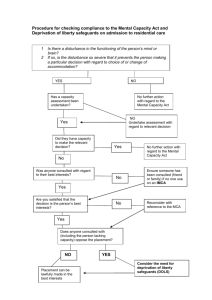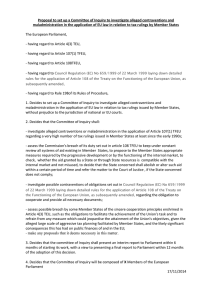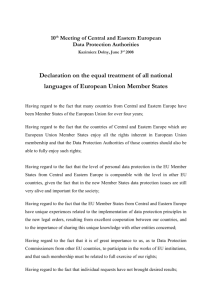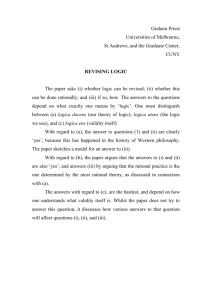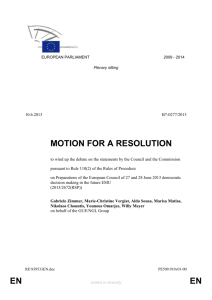The EU Fundamental Rights Agency in the
advertisement
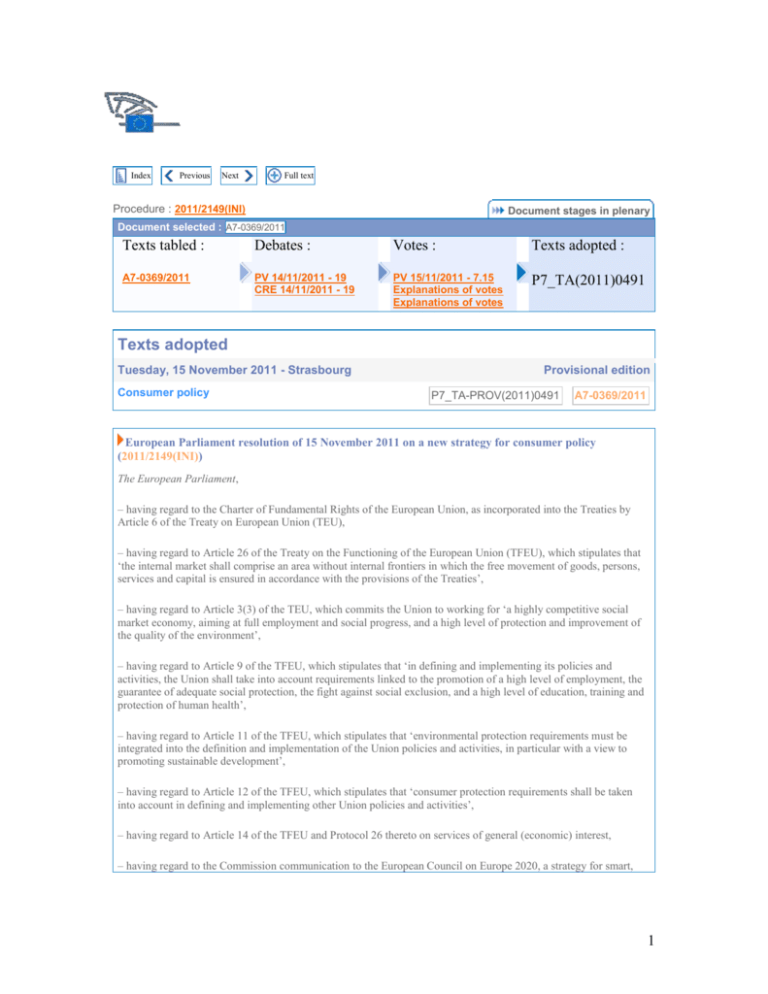
European Parliament Index Previous Next Full text Procedure : 2011/2149(INI) Document stages in plenary Document selected : A7-0369/2011 Texts tabled : Debates : Votes : Texts adopted : A7-0369/2011 PV 14/11/2011 - 19 CRE 14/11/2011 - 19 PV 15/11/2011 - 7.15 Explanations of votes Explanations of votes P7_TA(2011)0491 Texts adopted Tuesday, 15 November 2011 - Strasbourg Consumer policy Provisional edition P7_TA-PROV(2011)0491 A7-0369/2011 European Parliament resolution of 15 November 2011 on a new strategy for consumer policy (2011/2149(INI)) The European Parliament, – having regard to the Charter of Fundamental Rights of the European Union, as incorporated into the Treaties by Article 6 of the Treaty on European Union (TEU), – having regard to Article 26 of the Treaty on the Functioning of the European Union (TFEU), which stipulates that ‘the internal market shall comprise an area without internal frontiers in which the free movement of goods, persons, services and capital is ensured in accordance with the provisions of the Treaties’, – having regard to Article 3(3) of the TEU, which commits the Union to working for ‘a highly competitive social market economy, aiming at full employment and social progress, and a high level of protection and improvement of the quality of the environment’, – having regard to Article 9 of the TFEU, which stipulates that ‘in defining and implementing its policies and activities, the Union shall take into account requirements linked to the promotion of a high level of employment, the guarantee of adequate social protection, the fight against social exclusion, and a high level of education, training and protection of human health’, – having regard to Article 11 of the TFEU, which stipulates that ‘environmental protection requirements must be integrated into the definition and implementation of the Union policies and activities, in particular with a view to promoting sustainable development’, – having regard to Article 12 of the TFEU, which stipulates that ‘consumer protection requirements shall be taken into account in defining and implementing other Union policies and activities’, – having regard to Article 14 of the TFEU and Protocol 26 thereto on services of general (economic) interest, – having regard to the Commission communication to the European Council on Europe 2020, a strategy for smart, 1 sustainable and inclusive growth (COM(2010)2020), – having regard to its legislative resolution of 6 July 2011 on the Council position at first reading with a view to the adoption of a regulation of the European Parliament and of the Council on the provision of food information to consumers, amending Regulations (EC) No 1924/2006 and (EC) No 1925/2006 and repealing Directives 87/250/EEC, 90/496/EEC, 1999/10/EC, 2000/13/EC, 2002/67/EC, 2008/5/EC and Regulation (EC) No 608/2004 (1), – having regard to its legislative resolution of 23 June 2011 on the proposal for a directive of the European Parliament and of the Council on consumer rights(2), – having regard to the European Consumer Centres' Network 2010 Annual Report, Office for Official Publications of the European Union, 2011, – having regard to the Commission Staff Working Paper of 7 April 2011 entitled ‘Consumer Empowerment in the EU’ (SEC(2011)0469), – having regard to the Commission communication of 11 March 2011 entitled ‘Consumers at home in the single market’, 5th Edition of the Consumer Conditions Scoreboard (SEC(2011)0299), – having regard to the Commission communication of 22 October 2010 entitled ‘Making Markets Work For Consumers’, 4th Edition of the Consumer Markets Scoreboard (SEC(2010)1257), – having regard to its resolution of 20 October 2010 on the financial, economic and social crisis: Recommendations concerning the measures and initiatives to be taken (mid-term report)(3), – having regard to its resolution of 21 September 2010 on completing the internal market for e-commerce(4), – having regard to its resolution of 5 July 2011 on a more efficient and fairer retail market(5), – having regard to Professor Mario Monti's report of 9 May 2010 to the Commission on revitalising the Single Market, entitled ‘A New Strategy For The Single Market’, – having regard to its resolution of 20 May 2010 on delivering a Single Market to consumers and citizens (6), – having regard to its resolution of 9 March 2010 on consumer protection (7), – having regard to the report from the Commission to the European Parliament and to the Council of 2 July 2004 on the application of Regulation (EC) No 2006/2004 of the European Parliament and of the Council of 27 October 2004 on cooperation between national authorities responsible for the enforcement of consumer protection laws (the Regulation on consumer protection cooperation) (COM(2009)0336), – having regard to the Commission communication to the European Parliament, the Council, the European Economic and Social Committee and the Committee of the Regions on cross-border business-to-consumer e-commerce in the EU (COM(2009)0557), – having regard to the Commission communication of 7 July 2009 to the European Parliament, the Council, the European Economic and Social Committee and the Committee of the Regions on a harmonised methodology for classifying and reporting consumer complaints and enquiries (COM(2009)0346) and to the accompanying Draft Commission Recommendation (SEC(2009)0949), – having regard to the Commission communication of 2 July 2009 on the enforcement of the consumer acquis (COM(2009)0330) and to the Commission report of 2 July 2009 on the application of Regulation (EC) No 2006/2004 of the European Parliament and the Council on cooperation between national authorities responsible for the enforcement of consumer protection laws (the ‘Regulation on consumer protection cooperation’) 2 (COM(2009)0336), – having regard to the Commission recommendation of 29 June 2009 on measures to improve the functioning of the Single Market(8) and to the Commission recommendation of 12 July 2004 on the transposition into national law of directives affecting the internal market(9), – having regard to Directive 2009/48/EC of the European Parliament and of the Council of 18 June 2009 on the safety of toys (Toy Safety Directive)(10), – having regard to Regulation (EC) No 765/2008 of the European Parliament and of the Council of 9 July 2008 setting out the requirements for accreditation and market surveillance relating to the marketing of products, which aims to create an overall framework of rules and principles in relation to accreditation and market surveillance (11), – having regard to the communication from the Commission to the Council, the European Parliament and the European Economic and Social Committee entitled ‘EU Consumer Policy strategy 2007-2013 – Empowering consumers, enhancing their welfare, effectively protecting them’ and to Parliament's resolution of 20 May 2008 on the EU consumer policy strategy 2007-2013(12), – having regard to the report of the European Economic and Social Committee, Section for the Single Market, Production and Consumption, on ‘Obstacles to the European Single Market 2008’ (13), – having regard to Regulation (EC) No 2006/2004 of the European Parliament and of the Council of 27 October 2004 on cooperation between national authorities responsible for the enforcement of consumer protection laws (the ‘Regulation on consumer protection cooperation’)(14), – having regard to its resolution of 12 December 2006 on the Council common position for adopting a decision of the European Parliament and of the Council establishing a programme of Community action in the field of consumer policy (2007-2013)(15), – having regard to Directive 2005/29/EC of the European Parliament and of the Council of 11 May 2005 concerning unfair business-to-consumer commercial practices in the internal market and amending Council Directive 84/450/EEC, Directives 97/7/EC, 98/27/EC and 2002/65/EC of the European Parliament and of the Council and Regulation (EC) No 2006/2004 of the European Parliament and of the Council (‘Unfair Commercial Practices Directive’)(16), – having regard to Directive 2004/113/EC of the Council of 13 December 2004 implementing the principle of equal treatment between men and women in the access to and supply of goods and services (17), – having regard to Rule 48 of its Rules of Procedure, – having regard to the report of the Committee on the Internal Market and Consumer Protection and the opinion of the Committee on Economic and Monetary affairs (A7-0369/2011), A. whereas EU citizens have a crucial role to play as consumers in achieving the Europe 2020 goals of smart, inclusive and sustainable growth, since consumer expenditure generates more than half of EU GDP; B. whereas, according to the Material Deprivation Rate index, 16.3% of the EU's population is at risk of poverty, and whereas this percentage rises to 17.1% for women; C. whereas, as shown in the Special Eurobarometer 342 on Consumer empowerment from April 2011, a substantial majority of consumers feels confident and knowledgeable, but, at the same time, a considerable proportion lack knowledge about basic consumer legislation; D. whereas consumers do not form one single homogenous group, as there are considerable differences among 3 consumers in terms of consumer skills, awareness of legislation, assertiveness and willingness to seek redress; E. whereas, according to the Special Eurobarometer 342 on Consumer empowerment from April 2011, women spend more time shopping (3.7 hours in a typical week) than men (2.8 hours); F. whereas, according to the 5th edition of the Consumer Conditions Scoreboard of March 2011, consumers still face very different conditions across the EU; G. whereas consumers' dissatisfaction with the functioning of financial services stems in part from the bad advice they receive and the fact that, according to the Consumer Markets Scoreboard, the majority of consumers do not know their rights in relation to financial services and 98 % fail to choose the most appropriate investment option, at an estimated cost of 0.4 % of EU GDP; H. whereas disclosure of information is both necessary and important in all sectors of financial services for consumers; whereas the strategy must recognise that it is not sufficient merely to provide competitive markets in which consumers can make decisions in their best interests; whereas if this disclosure is to be more efficient, it is important that information should be provided in EU and regional official languages; I. whereas groups of people who are particularly vulnerable because of their mental, physical or psychological infirmity, age or credulity - for example children, teenagers and the elderly - or are made vulnerable by their social and financial situation (such as those with excessive debts) need special protection; J. whereas the EU has set targets for the reduction of CO2 emissions, calling for more sustainable patterns of consumption; K. whereas a properly functioning internal market should offer consumers a wider choice of high-quality products and services at competitive prices and, at the same time, a high level of consumer and environmental protection; L. whereas the internal market must grow without undermining consumer protection and whilst guaranteeing the free movement of services and ensuring that due attention is paid to the protection of workers; M. whereas empowered consumers are better able to identify the best prices, selling conditions and quality, therefore driving competition and innovation; N. whereas a fully integrated internal market would create multiple benefits for European consumers, such as lower prices and a wider selection of products and services; O. whereas, as shown in the Consumer Conditions Scoreboard from March 2011, retailers show a lack of knowledge of basic EU consumer rights, which can both work to the detriment of consumers and also affect retailers' own willingness to trade cross-border; P. whereas all stakeholders (including the Commission, national enforcement authorities, consumer organisations and the private sector) need to step up their efforts to achieve the objective of a high level of consumer protection and empowerment, as the effectiveness of public market surveillance and enforcement are vital to ensuring that illegal and unsafe products do not reach or are removed from the European market; Q. whereas, given the current economic downturn, strong and consistent enforcement is all the more important, as the crisis is affecting consumers' choices; R. whereas the European Parliament and national parliaments must contribute to the more effective transposition and enforcement of consumer protection legislation by continuing to work closely with each other; S. whereas the European Parliament and national parliaments should protect the health and well-being of EU citizens; 4 Core objectives 1. Welcomes the Commission's initiative to launch a Consumer Agenda, and emphasises the need for the Commission to propose a proactive policy for defining smart regulation, with the objective of achieving a coherent legal framework; calls, further, for all future consumer policy measures to be based on a holistic approach which places consumers at the heart of the Single Market; 2. Stresses that policy priorities should be linked and be supported by statistics from the Consumer Scoreboard; calls on the Commission to take account in its consumer policy strategy of the recently published top 20 main concerns of citizens and businesses regarding the Single Market; 3. Welcomes the Commission's proposals in its 2012 Work Programme to review consumer policy and its legislative strategy, integrating initiatives across all its responsible services; notes, in particular, the need to ensure that consumers throughout the EU receive the full protection offered by key items of legislation, such as the Unfair Commercial Practices and Consumer Credit Directives; 4. Welcomes the strategic approach to consumer protection, drawing on lessons from the 2007-2013 strategy; emphasises the need for better coordination between consumer policy and social and environmental goals, as part of the Europe 2020 strategy; 5. Emphasises the need for the proper implementation and enforcement of existing legislation (in particular the latest consumer rights directive) accompanied by dissemination of appropriate information concerning the rights and obligations of each party; emphasises, further, the need to examine the existing acquis following the adoption of the consumer rights directive and in the light of planned new initiatives; 6. Stresses the need for coherence in the way that policies on consumer protection are implemented and, in that connection, proposes that discussions be re-opened on how this portfolio is divided up within the Commission; 7. Calls on the Commission to ensure better coordination between its policies which affect consumers; 8. Calls on the Commission and the Member States to strengthen international cooperation and the exchange of information with non-EU countries in the field of consumer protection; 9. Highlights the numerous challenges facing the Consumer Agenda, including empowering consumers and reducing levels of inequality, encouraging sustainable consumption, reducing consumer exposure to unsafe products and protecting consumers, especially children, against misleading advertising; calls for an in-depth review among policymakers of ways of designing smarter policies which provide consumers with information they need and can actually use, without creating additional burdens for companies; 10. Calls on the Commission to guarantee special protection for groups of consumers who are particularly vulnerable because of their mental, physical or psychological infirmity, age or credulity, or made vulnerable by their social and financial situation; supports the Commission's work on behavioural economics, seeing this as essential to ensuring that consumer protection measures are effective in practice; 11. Urges the Commission to improve the criteria and arrangements for carrying out more impact assessments, and to review, where appropriate, EU legislation which has an impact on consumer policy and establish best practices by means of which Member States can implement existing legislation correctly; Consumer empowerment 12. Notes the significant increase in e-commerce, which is now very important to consumers, with 40% of EU citizens purchasing online; points out that consumers' and retailers' confidence needs to be increased, particularly as regards cross-border online purchasing and trading, by guaranteeing their respective rights and obligations on the internet; 5 13. Deplores the large gap between the levels of domestic and cross-border online retail purchasing; notes that according to the Consumer Scoreboard 44% of consumers say that uncertainty about their rights discourages them from buying goods from other Member States and that late or non-delivery and fraud are the major factors preventing take-up in cross-border purchasing; calls, therefore, for the EU's consumer policy strategy to support growth and innovation in the retail sector and, in particular, the completion of the digital single market, in order to help EU consumers shop cross-border; 14. Points out that consumer confidence is a driving force in the economy with regard to both domestic and crossborder trade, online and offline; 15. Stresses the need to inform consumers about their rights and obligations and ensure that consumers' rights are fully respected when it comes to internet use and protection of intellectual property rights, at the same time protecting personal data and privacy; 16. Stresses that consumers' personal data have substantial economic value, for example databases containing consumer profiles used in connection with targeted advertising; points out that users are mostly unaware of the value of the data they voluntarily make available to companies; asks the Commission to ensure that there is a sufficient degree of competition in the market for on-line advertising and search engines and monitor the way data is used by the companies concerned, in accordance with the existing data protection framework; 17. Emphasises the need to provide consumers and traders with more transparent and comparable information, for example through the use of unit price indications and accurate and transparent internet price-comparison websites, as well as meaningful and effective product labelling; 18. Emphasises the importance of labelling and, in this context, calls on the Commission to take account of consumers' growing calls concerning, for example, fair trade, carbon footprints, the scope for and types of recycling and origin marking; 19. Underlines the need to ensure universal access to fast broadband and telecommunications networks and broad access to goods and services online, including by removing distribution restrictions, tackling geographic segmentation and developing electronic payment services; 20. Emphasises that the Consumer Agenda needs to highlight the market in content for digital products, e.g. e-books; 21. Emphasises the need to empower consumers by providing them with useful, targeted and understandable information; insists that the EU and national authorities, and consumer organisations and companies, need to step up their efforts to improve consumer education; calls on the Commission to propose ‘consumer-friendly’ Single Market legislation, so as to ensure that consumer interests are fully taken into account in the functioning of the Single Market; 22. Calls on the Commission and Member States to provide adequate support and capacity building to consumer organisations in each Member State, with a view to strengthening their role and resources, thereby enhancing consumer empowerment; 23. Stresses the need to educate consumers, from as early an age as possible, so that they understand and make use of the information appearing on products; calls on the Commission to make European logos for which the recognition rate still appears unsatisfactory (in particular the CE conformity marking logo, the European Ecolabel, the Möbius strip for recycling or risk marking) more identifiable and more intuitive; 24. Calls on the Commission to launch information campaigns in all the Member States concerning the European ‘CE’ designation and the significance thereof, making it clear to consumers what it does (or does not) represent and providing them with more comprehensive information, while seeking to raise awareness of product safety in professional circles; 25. Believes that civil society, together with consumer organisations and businesses, should further channel innovative solutions for the dissemination of single market information, thereby enabling people to take full 6 advantage of existing opportunities; emphasises the important role played by civil society in helping SMEs and consumers, particularly those in the most vulnerable positions, such as young people or those without internet access, to overcome existing linguistic, technological and administrative barriers and restrictions in Member States; 26. Deplores the fact that switching provider or tariff is still difficult in certain sectors, hampering consumers' freedom of choice and damaging competition; calls on the Commission to look more closely into this issue to ensure that consumers reap the full benefits of the Single Market; 27. Calls on the Commission to look into the remaining obstacles to bank switching by consumers and to consider ways of eliminating them, such as setting up an EU-wide bank account number portability system; 28. Notes the importance to consumers with access to bank accounts of transparent bank charges, faster transaction times and easier procedures for moving bank accounts; 29. Notes that some 30 million EU citizens do not have access to basic banking services and calls on the Commission to put forward a proposal, as it announced it would do in the Single Market Act and in its 2011 work programme; Consumer protection and product safety 30. Emphasises the need to design consumer policies that take the specific characteristics of vulnerable consumer groups into account; 31. Calls for explicit links to be established between the strategy and the competition policy programme, and joinedup action to achieve this, so consumers can benefit from services which are better adapted to their needs and supplied on better terms; 32. Stresses the urgent need to increase the general level of safety of consumer products in the EU, especially in the framework of the forthcoming revision of the General Product Safety Directive; calls on the Commission, in cooperation with the responsible EU agencies, to look more closely into the issues of the impact of chemicals on consumers' health, antibiotic resistance and nanotechnologies, on the basis of existing EU legislation in those fields; 33. Stresses, further, the need to increase the safety standards for toys, and urges Member States quickly to transpose and fully implement the new Toy Safety Directive; 34. Calls on the Commission to develop a common assessment and labelling system, as indicated in its resolution on a single market for enterprises and growth, based on the product's whole life cycle, particularly in order to simplify and harmonise systems, overcome the cost of fragmentation for business and consumers and prevent misleading advertising; 35. Calls for better product safety guarantees, particularly in e-commerce on the internal market; 36. Calls for the RAPEX notification system to be strengthened and made more effective and transparent for consumers, in order to improve overall awareness of the risks posed by specific consumer products and enable companies and customs authorities to take swift and appropriate action; 37. Notes, in that connection, the importance of transparent and reliable markets, of improving professional standards and avoiding conflicts of interest in the provision of financial services to consumers, and the crucial role of financial education; 38. Stresses the importance of access to financial education and financial advice, and calls for better regulation of financial advisory services; 39. Points out that the new European Supervisory Authorities (ESAs) have explicit powers and responsibilities relating to consumer protection in the area of financial services and expects the strategy to reflect these and enhance the consumer-protection capabilities of the ESAs, drawing on national authorities' existing best practices and 7 ensuring adequate participation by interested parties, notably consumer representatives; 40. Calls for a high level of consumer protection to be established throughout the EU, so that the internal market in the field of financial services can be further strengthened and protectionist practices combated; 41. Calls for targeted funding to be allocated to consumer research projects, especially in the field of consumer behaviour and data collection, to help design policies that meet the needs of consumers; 42. Proposes expanding European support for research in emerging sectors, such as green and ethical consumption, and for the pooling of everyday consumer goods (cars, bicycles, household appliances, etc.); 43. Calls on the Commission to continue its work on the sale of goods and unfair contract terms, a review of the rules on unfair commercial practices (UCP), the Consumer Credit Directive, the Misleading Advertising Directive and the broader issue of whether the rules on UCP need to apply to business-to-business relations; urges Member States to fully and correctly implement internal market rules and legislation, in particular the consumer rights directive, the Ecommerce directive and the regulation on the provision of food information to consumers; 44. Calls on the Commission to highlight the importance of standardisation in the Consumer Agenda, with a view to simplifying complex processes and complex consumer information on services, for example, and to ensure that both consumer organisations and national authorities are involved in this important task; Towards a more social and sustainable consumer policy in Europe 45. Calls on the Commission to include a consumer accessibility element in the Consumer Agenda in order to make sure that vulnerable groups have access to the essential products and services they need; points out that this will clearly demonstrate the social dimension of consumer policies; 46. Points out that older people and people with disabilities are still faced by safety and access problems in connection with mainstream products and services; points out, in that connection, that standards can be successfully used to make products and services accessible to as many consumers as possible, irrespective of their age or physical abilities; 47. Calls on the Commission to take the gender perspective into account in the Consumer Agenda, in keeping with its commitment to implementing gender mainstreaming as an integral part of its policymaking; calls on the Commission to ensure that the Consumer Agenda rules out all discrimination on grounds of sex in connection with access to and the supply of goods and services; 48. Calls on the Commission to address the issue of how private consumption can become more sustainable in order to promote innovation, economic growth and a low-carbon economy, in keeping with the objective set in the Europe 2020 strategy; takes the view that special attention should be paid to smart energy systems: the use of new technologies should enable all network users to participate in the internal energy market, in order to save energy and reduce or mitigate the costs of energy, while safeguarding the supply of energy to vulnerable consumers; 49. Calls on the Commission, Member States and stakeholders to coordinate their efforts to inform consumers better about more efficient ways to buy and consume food, in order to prevent and combat food waste; 50. Stresses the importance of evaluating the impact of liberalisation on consumer satisfaction, and calls, in that connection, for an assessment of the functioning of the energy market; Enforcement of consumer rights and redress 51. Encourages the Commission to further support and spotlight the work of the European Consumer Centres network (ECC-Net), which should play a central role in informing consumers of their rights and in supporting them if they make a complaint; emphasises the key role played by the Cross-border Enforcement and Cooperation Network (CPC Network) in ensuring that consumer protection laws are correctly enforced and fostering cooperation among 8 competent national authorities; 52. Calls on the Commission to use all its powers under the Treaties to improve the transposition, application and enforcement of all consumer-related EU legislation; calls on the Member States to step up their efforts to fully and correctly implement this legislation; 53. Calls for more accessible and more effective redress mechanisms, such as alternative dispute resolution, collective redress or online dispute resolution, in order to empower consumers throughout the EU; notes with concern that the current lack of compensation is a major loophole in the legal system as it allows for illegal profits to be retained by traders; 54. Calls for accessible and effective redress mechanisms for European consumers, as these are essential if barriers in the internal market, particularly as regards e-commerce, are to be eliminated, and calls on the Commission to come forward with one or more proposals through the ordinary legislative procedure, thereby ensuring the proper involvement of Parliament; 55. Welcomes the ongoing work to develop a European alternative dispute resolution (ADR) system, using existing national and business systems to combine a high level of consumer protection with fair conditions of trade for entrepreneurs; 56. Calls on the Commission to draw on best practices from Member States, such as the Nordic ombudsman model, and to consider giving ECC-Net legal authority in the area of consumer dispute resolution; 57. Believes that such a system will enhance the Single Market and deliver a fair system of redress for consumers in cross-border disputes, thereby building confidence between consumers and industry and avoiding costly litigation for both the industry and consumers; 58. Calls on the Commission to launch an interinstitutional debate on the appropriate way forward in order to improve the legal protection of consumers in their market transactions, with due regard to the approach set out in the Consumer Rights Directive; 59. Stresses the need for the forthcoming Multiannual Financial Framework for the post-2013 period to include adequate funding for measures to achieve the goals set out in this report and in the forthcoming Consumer Agenda; points out that adequate and guaranteed funding from the EU is required if consumer organisations are to be able to represent consumers in all Member States; o oo 60. Instructs its President to forward this resolution to the Council, the Commission and the governments and parliaments of the Member States. (1) (2) (3) (4) (5) (6) (7) Texts adopted, P7_TA(2011)0324. Texts adopted, P7_TA(2011)0293. Texts adopted, P7_TA(2010)0376. Texts adopted, P7_TA (2010)0320. Texts adopted, P7_TA(2011)0307. Text adopted, P7_TA(2010)0186. Texts adopted, P7_TA (2010)0046. 9 (8) OJ L 176, 7.7.2009, p. 17. (9) OJ L 98, 16.4.2005, p. 47. (10)OJ L 170, 30.6.2.2009, p. 1. (11)OJ L 218, 13.8.2008, p. 30. (12)OJ C 180E, 17.7.2008, p. 26. (13)http://www.eesc.europa.eu/smo/news/Obstacles_December-2008.pdf. (14)OJ L 364, 9.12.2004, p. 1. (15)OJ L 404, 30.12.2006, p. 39. (16)OJ L 149, 11.6.2005, p. 22. (17)OJ L 373, 21.12.2004, p. 37. Last updated: 16 November 2011 Legal notice 10

